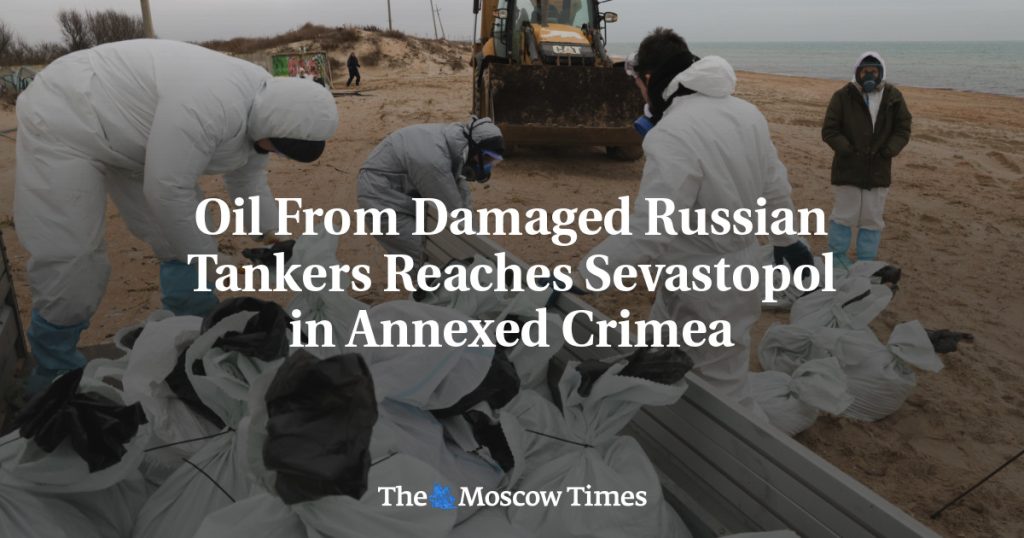The recent oil spill near the shores of Sevastopol in annexed Crimea was caused by two Russian oil tankers, Volgoneft-212 and Volgoneft-239, being damaged in a storm last month. The incident occurred in the Kerch Strait, connecting the Sea of Azov and the Black Sea. The vessels were carrying a total of 9,200 tons of heavy fuel oil, with approximately 40% of the cargo spilling into the sea. Russian President Vladimir Putin labeled the incident as an “ecological disaster,” as the oil slick reached Sevastopol, causing further environmental damage.
Sevastopol, a city home to over half a million people and the Russian Navy’s Black Sea Fleet, has been a target of Ukrainian attacks since the full-scale invasion in February 2022. Authorities in Russia have mentioned that the type of oil involved in the spill, M-100 grade mazut, is challenging to clean up due to its density and tendency to sink below the water’s surface. The Russian Transportation Ministry noted that there is currently no proven technology available globally to effectively remove this type of oil from the water column. Efforts to clean up the spill are primarily reliant on volunteers and focus on collecting oil as it washes ashore, with extensive cleanup estimates anticipated.
Cleanup efforts have been ongoing, with volunteers playing a crucial role in collecting contaminated sand and soil from beaches in Crimea and southern Russia. So far, approximately 78,000 tons of contaminated material have been removed, and estimates suggest that up to 200,000 tons may need to be cleaned up. Despite the challenges posed by the type of oil spilled and the lack of specialized cleanup technology, authorities are working to mitigate the environmental impact of the spill. The oil slick’s presence in Sevastopol highlights the urgent need for effective cleanup measures and collaboration between local authorities and volunteers to address the ecological ramifications of the incident appropriately.
The Russian government’s response to the oil spill has been criticized, with volunteers stepping up to assist in cleanup efforts amid alleged shortcomings in the official response. The reliance on volunteers reflects the gaps in the government’s capacity to address the spill effectively. The current cleanup focus is on removing oil that washes ashore, highlighting the need for a comprehensive and coordinated cleanup strategy to manage the spill’s aftermath. The situation underscores the importance of community involvement and support in dealing with environmental disasters and highlights the need for government authorities to prioritize environmental protection and sustainable practices to prevent similar incidents in the future.
The ongoing oil spill near Sevastopol serves as a reminder of the environmental risks associated with maritime transport and the challenges posed by oil spills in sensitive ecosystems. The incident underscores the importance of robust safety measures and emergency response protocols to minimize the impact of such disasters on the environment and local communities. Collaborative efforts between government agencies, local authorities, volunteers, and environmental organizations are essential to effectively manage and mitigate the consequences of oil spills. Furthermore, the incident highlights the need for enhanced monitoring and enforcement of maritime safety regulations to prevent future accidents and protect marine ecosystems from potential harm.
In conclusion, the oil spill near Sevastopol in annexed Crimea caused by the damaged Russian oil tankers has raised concerns about the environmental impact on the region, highlighting the need for prompt and coordinated cleanup efforts. The involvement of volunteers in assisting with cleanup activities underscores the importance of community engagement in addressing environmental disasters. The lack of specialized technology to clean up the spilled oil emphasizes the need for innovative solutions and investment in environmental protection measures to prevent similar incidents in the future. Addressing the ecological consequences of the spill requires a multi-faceted approach involving government authorities, local communities, and environmental experts to ensure the effective restoration of affected ecosystems and safeguarding of marine biodiversity.


